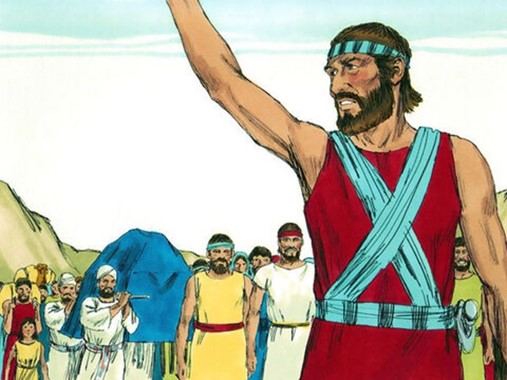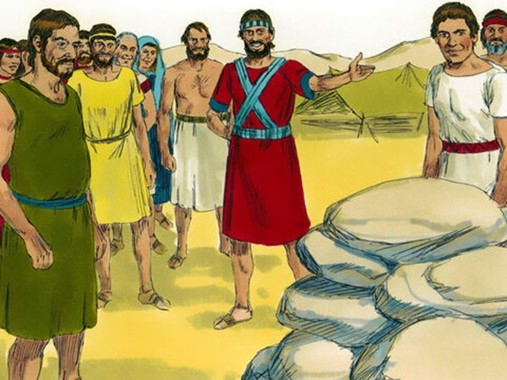Good morning!
Greetings in the name of the Father, the Son, and the Holy Spirit.
When you pass through the waters, I will be with you; and when you pass through the rivers, they will not sweep over you. When you walk through the fire, you will not be burned; the flames will not set you ablaze. (Isaiah 43:2)

Today, we delve into Joshua 3, a chapter that vividly depicts the Israelites’ miraculous crossing of the Jordan River. This event is not merely a historical account but a powerful symbol of God’s faithfulness and the steps of faith required to enter into His promises. As the Israelites stood at the banks of the Jordan, they faced a significant barrier to entering the Promised Land. The river, at flood stage, represented more than just a physical obstacle; it was a test of their trust in God and His promises.
In Joshua 3, we see a blend of divine intervention and human obedience. God instructs Joshua on the specific actions to take, and the people are called to follow in faith. The crossing of the Jordan River serves as a reminder that stepping into God’s promises often requires us to face seemingly insurmountable challenges. However, when we obey God’s guidance and trust in His power, He makes a way where there seems to be no way.
In this sermon, we will explore three key themes from Joshua 3: the preparation for stepping into God’s promises, the power of collective faith and obedience, and the significance of commemorating God’s faithfulness. Let us open our hearts to the lessons this passage holds, understanding how they apply to our journey of faith today.

Preparing to Step Into God’s Promises
– Joshua 3:1-6
– Psalm 119:105: “Your word is a lamp for my feet, a light on my path.”
In Joshua 3, we find the Israelites at a pivotal moment as they prepare to cross the Jordan River into the Promised Land. This preparation is not merely logistical but deeply spiritual, highlighting the importance of readiness in stepping into God’s promises. The passage provides profound insights into how we, too, can prepare ourselves for the challenges and opportunities God sets before us.
The Israelites’ preparation at the Jordan serves as a model for our spiritual journey. In Joshua 3:5, Joshua tells the people, “Consecrate yourselves, for tomorrow the Lord will do amazing things among you.” Consecration, the act of dedicating oneself to God’s service, is a critical step in preparing to receive His promises. It involves setting aside distractions, purifying our hearts, and aligning our will with God’s. This process of consecration is a deliberate and intentional action, signaling our readiness to follow God’s leading.
Consecration also involves seeking God’s direction and guidance. Before taking significant steps in our lives, whether in personal decisions, career moves, or ministry opportunities, it is vital to seek God’s will. Proverbs 3:6 instructs us, “In all your ways submit to him, and he will make your paths straight.” Seeking God’s direction through prayer, meditation, and counsel ensures that we are not relying solely on our understanding but are guided by His wisdom.
God’s Word plays a central role in guiding us as we prepare to embrace His promises. Psalm 119:105 describes God’s Word as a lamp and a light, illuminating our path and providing clarity in decision-making. Scripture is a source of wisdom, comfort, and instruction, helping us navigate life’s complexities. Regular engagement with the Bible – through reading, study, and application – equips us with the knowledge and discernment needed to move forward in God’s plans.
The Israelites’ experience at the Jordan also teaches us about the importance of community in our preparation. As they gathered at the river’s edge, their unity and collective readiness were key to their successful crossing. Similarly, our preparation is often supported and enriched by our faith community. Hebrews 10:24-25 encourages us to “consider how we may spur one another on toward love and good deeds, not giving up meeting together… but encouraging one another.” The support, accountability, and encouragement we receive from fellow believers are invaluable as we prepare to step into God’s promises.
Furthermore, preparing to step into God’s promises involves acknowledging and trusting in His timing. The Israelites had to wait until the conditions were right for crossing the Jordan. In our lives, waiting for God’s timing can be challenging, especially when we are eager to move forward. However, Isaiah 40:31 reminds us, “those who hope in the Lord will renew their strength.” Trusting in God’s timing ensures that we move in sync with His perfect plan.
In conclusion, preparing to step into God’s promises is a multifaceted process involving consecration, seeking God’s direction, engaging with His Word, fostering community, and trusting in His timing. As we reflect on the Israelites’ preparation at the Jordan, let us be inspired to similarly prepare our hearts and minds. May we dedicate ourselves to God, seek His guidance, and rely on His Word as we ready ourselves for the amazing things He has in store for us.

The Power of Collective Faith and Obedience
– Joshua 3:7-13
– Hebrews 11:29: “By faith the people passed through the Red Sea as on dry land; but when the Egyptians tried to do so, they were drowned.”
The crossing of the Jordan River in Joshua 3 is a striking example of the power of collective faith and obedience. As the Israelites prepared to enter the Promised Land, they were instructed to follow the ark of the covenant, carried by the priests, into the river. This act required not only individual faith but also a collective trust in God’s promise and power.
The ark of the covenant represented God’s presence among the Israelites. As they followed it into the Jordan, they were demonstrating their faith in God’s guidance and protection. This collective faith was crucial for what happened next. In Joshua 3:13, it is stated that as soon as the priests’ feet touched the water, the river stopped flowing, allowing the people to cross on dry ground. This miracle mirrored the parting of the Red Sea and was a powerful demonstration of God’s ability to make a way where there seems to be no way.
The role of leadership in this event is also significant. Joshua, as the leader appointed by God, played a critical role in guiding and encouraging the people. His obedience to God’s instructions and his faith were instrumental in leading the Israelites. The priests, who carried the ark, also demonstrated leadership through their obedience and faith. Their actions set an example for the rest of the people to follow. This underscores the impact of leadership and unity in faith on achieving God’s purposes.
The collective obedience of the Israelites is another key aspect of this story. Their willingness to follow God’s command, even when it meant stepping into a flooded river, is a testament to their trust in Him. This obedience was not blind but was based on their knowledge of God’s past deeds and His promises. It reflects the principle found in 1 Samuel 15:22: “To obey is better than sacrifice, and to heed is better than the fat of rams.”
This story also teaches us about the importance of community in our faith journey. The Israelites’ experience at the Jordan River shows how our faith and obedience can be strengthened and supported by the faith and obedience of others. Ecclesiastes 4:9-10 says, “Two are better than one… If either of them falls down, one can help the other up.” In our spiritual walk, being part of a community of believers provides encouragement, support, and accountability.
Furthermore, the crossing of the Jordan River illustrates how our faith and obedience, both individually and collectively, play a role in experiencing God’s wonders. As the Israelites stepped into the river, they experienced the miraculous power of God. This encourages us to step out in faith, both as individuals and as a community, trusting that God will work wonders in our midst.
In conclusion, the power of collective faith and obedience is clearly demonstrated in the crossing of the Jordan River. It teaches us about the importance of following God’s presence, the impact of godly leadership, the strength of a united community of believers, and the role of obedience in experiencing God’s miraculous works. As we reflect on this event, let us be inspired to cultivate a collective faith and obedience in our own communities, trusting that together, we can witness the incredible ways God moves in our lives.

Commemorating God’s Faithfulness
– Joshua 3:14-17
– Joshua 4:1-7
The crossing of the Jordan River by the Israelites in Joshua 3 and 4 is not only a historical event of great significance but also serves as a powerful memorial of God’s faithfulness. This act of crossing on dry ground, as the waters of the Jordan were miraculously stopped, stands as a testament to God’s power and His unwavering commitment to His people. The event’s commemoration through the setting up of memorial stones in Joshua 4 underlines the importance of remembering and celebrating God’s past deeds.
The significance of this event as a memorial is profound. In Joshua 4:1-7, God instructs Joshua to have one man from each tribe take a stone from the middle of the Jordan, from the very place where the priests stood, and to set them up as a memorial at their camp. These stones were to serve as a sign among them, so that when future generations asked about their meaning, the story of how the Jordan was crossed would be recounted. This memorial was a physical representation of a spiritual truth – God’s faithfulness and power.
Remembering and celebrating God’s past deeds is crucial as we face new challenges and uncertainties. Recalling how God has worked in our lives in the past gives us confidence and hope for the future. It strengthens our faith, reminding us that the same God who delivered us before is with us now. Psalm 77:11-12 reflects this sentiment: “I will remember the deeds of the Lord; yes, I will remember your miracles of long ago. I will consider all your works and meditate on all your mighty deeds.”
Building spiritual ‘memorials’ in our lives is a way of keeping God’s faithfulness at the forefront of our minds. These memorials can take various forms – journaling our experiences with God, commemorating significant spiritual milestones, or establishing family traditions that celebrate God’s work in our lives. Just as the Israelites set up stones to remember their crossing of the Jordan, we too can establish tangible reminders of God’s faithfulness in our journey.
These memorials also serve an important purpose for future generations. They are a way of passing down our faith and the stories of God’s faithfulness. In a world where distractions are many and memories can be short, these spiritual markers help to keep the truth of God’s work alive in the hearts and minds of our children and their children after them. Deuteronomy 6:12 cautions us, “Be careful that you do not forget the Lord, who brought you out of Egypt, out of the land of slavery.”
Furthermore, commemorating God’s faithfulness encourages us to maintain a posture of gratitude and worship. It helps us to recognize that every victory and breakthrough we experience is not by our might or power but by God’s Spirit (Zechariah 4:6). It cultivates a heart of thankfulness and a lifestyle of worship, which are key to a deep and enduring relationship with God.
In conclusion, the crossing of the Jordan River and the setting up of memorial stones teach us about the importance of commemorating God’s faithfulness. As we remember and celebrate what God has done in our lives, we strengthen our faith, instill hope in future generations, and maintain a heart of gratitude. Let these memorials serve as constant reminders of God’s unfailing love and power, inspiring us to trust Him in every season of our lives.
Summary and Life Application
In summarizing Joshua 3, we are reminded of the profound importance of preparing for God’s promises, acting in collective faith and obedience, and commemorating God’s faithfulness. The crossing of the Jordan River teaches us that stepping into God’s promises often requires facing daunting challenges, but with preparation, faith, and obedience, we can experience His miraculous provision.
In our lives, we may face our own ‘Jordan Rivers’ – obstacles that seem impossible to overcome. We are called to prepare ourselves spiritually, seeking God’s guidance and consecrating our lives to Him. This preparation involves immersing ourselves in Scripture, prayer, and worship, aligning our hearts with God’s will.
The power of collective faith and obedience is also crucial. Like the Israelites following the ark, we are called to unite in faith, supporting and encouraging one another in our walk with God. Leadership and community play a vital role in our spiritual journey, and together, we can witness God’s wonders.
Finally, commemorating God’s faithfulness is essential. Just as the Israelites set up stones as a memorial, we, too, should regularly recall and celebrate God’s past deeds. These acts of remembrance strengthen our faith and serve as a testimony to future generations.
For practical application, consider what ‘Jordan River’ you may be facing in your life. Reflect on how you can prepare spiritually for this challenge, how you can contribute to and draw strength from your faith community, and how you can build memorials of God’s faithfulness in your life. Let the story of the Jordan River crossing inspire you to step out in faith, trusting in God’s power and promises.
Let us conclude with a prayer, asking for God’s guidance as we prepare to step into His promises, for unity and strength in our collective journey of faith, and for a heart that remembers and celebrates His enduring faithfulness. May we, like the Israelites, experience the wonder of walking through our ‘Jordan Rivers’ into the fullness of God’s promises. Amen.

Behold, to obey is better than sacrifice, and to listen than the fat of rams. (1 Samuel 15:22)
You are the God who performs miracles; you display your power among the peoples. (Psalm 77:14)
